May 11, 2018
Air Date: May 11, 2018
FULL SHOW
SEGMENTS
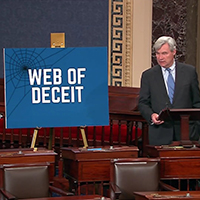
The Koch Brothers & Trump
View the page for this story
As close ties between fossil fuel billionaires Charles and David Koch and the Trump Administration come more to light, Democratic Senators are demanding answers about how much influence the Koch brothers have had in shaping key federal policies, including the decision to pull the U.S. out of the Paris Agreement, and the shrinking of national monuments. Senator Sheldon Whitehouse (D-RI) speaks with Host Steve Curwood about the stranglehold he says the climate change denying Koch network has on Republican lawmakers as well. (13:04)
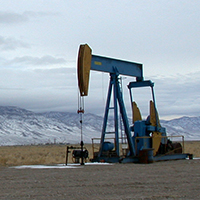
Beyond the Headlines
/ Peter DykstraView the page for this story
This week, Peter Dykstra shares with host Steve Curwood his insights on a Department of Energy report that shows the US is now the globe’s biggest oil producer, and US transportation emits more greenhouse gases than electricity generation. The pair also discuss how mercury from coal-fired power plants is polluting rice in China, and take a trip back to 1872 and a landmark mining law that has had a profound and lasting impact on the American West. (04:24)
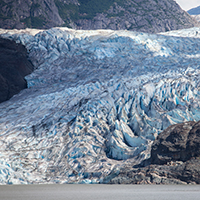
Alaska Youth Sue to Fight Climate Change
View the page for this story
16 young people are suing their home state of Alaska for failing to protect their constitutional right to a healthy environment. They argue the state must reduce greenhouse gas emissions though most of Alaska’s earnings depend on oil production. Host Steve Curwood discussed how this complicated suit might develop with Vermont Law School Professor, Pat Parenteau. (09:49)
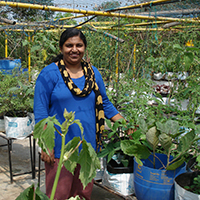
Pesticide Peril in Paradise
/ Helen PalmerView the page for this story
This week, we return to Kerala, India, to learn more about why that state’s food supply is going organic and how that ambitious target can be achieved. Part of the success will depend on Keralans who have taken up organic gardening as a hobby, or even a second career. They tend to their rooftop gardens, care for their backyard livestock, and sell extra produce at large organic markets where their healthy chemical free food sells for premium prices. Living on Earth’s Helen Palmer has the story. (18:51)
Show Credits and Funders
Show Transcript
HOST: Steve Curwood
GUESTS: Sheldon Whitehouse, Pat Parenteau,
REPORTERS: Peter Dykstra, Helen Palmer
[THEME]
CURWOOD: From Public Radio International, this is Living on Earth.
[THEME]
CURWOOD: I’m Steve Curwood. Congress probes the links between the Trump Administration and the influential fossil fuel and policy empire of Charles and David Koch.
WHITEHOUSE: Between the gas pump and the well head is an enormous amount of American industry in pipelines, petrochemical manufacturing, petrochemical refining, and the Koch brothers and Koch Industries sits in the middle of all of that.
CURWOOD: Also, in Kerala, city gardeners are growing a bounty of healthy food on their roof terraces.
MANU: We decided to call all our family here and we made food out of what we’d grown from our terrace. We’ll have boiled rice, and there would be a curry that is called a sambah, so it would be a complete vegetarian feast.
CURWOOD: That and more this week on Living on Earth – Stick Around!
[NEWSBREAK MUSIC: Boards Of Canada “Zoetrope” from “In A Beautiful Place Out In The Country” (Warp Records 2000)]
[THEME]
The Koch Brothers & Trump
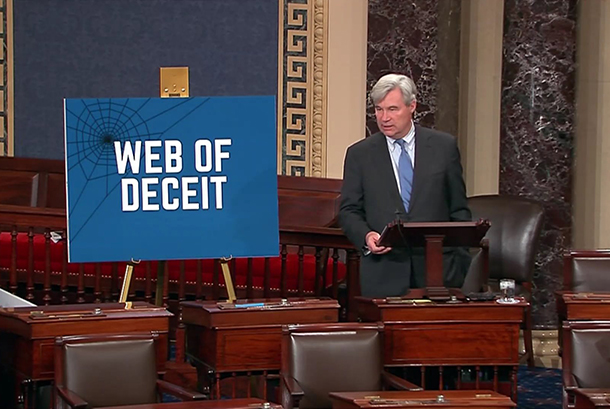
Senator Sheldon Whitehouse (D-RI) spoke on the Senate floor on April 23rd, 2018 to raise concerns about the connections between the Koch network, the Trump Administration, and Congress. (Photo: Office of Senator Sheldon Whitehouse)
CURWOOD: From PRI, and the Jennifer and Ted Stanley Studios at the University of Massachusetts, Boston, this is Living on Earth. I’m Steve Curwood. A group of six Democratic Senators has written to the Trump Administration asking it to explain its ties to the conservative fossil fuel magnates Charles and David Koch. The two brothers have claimed credit for such Administration policies as shrinking National Monuments, gutting the Clean Power Plan, killing a moratorium on coal leasing on public lands, and pulling out of the Paris Climate Agreement.
And though Charles and David Koch originally opposed Donald Trump, a survey by the watchdog group Public Citizen found more than 20 senior officials in the Trump White House, including the Vice President, have ties to the Koch network. Leading the Senate call concerning undue influence by the Kochs is Rhode Island’s Democratic Senator Sheldon Whitehouse. Senator, welcome back to Living on Earth!
WHITEHOUSE: Thank you very much, Steve. It is good to be with you.
CURWOOD: Great to have you back on the show. So, Senator, how much of an influence on the Congress and the Trump administration do you think that the Koch network has?
WHITEHOUSE: Massive. I don't think there's any group that has more influence. They run a political operation that is wealthier, better prepared, more disparate, has more updated data than the Republican Party itself, and I think it's very clear to Republicans that you cross the Koch brothers’ political operation at your peril.
CURWOOD: So, remind folks of the Koch brothers’ business. Why are they in this position?
WHITEHOUSE: Well, between the gas pump and the wellhead is an enormous amount of American industry in pipelines, in petrochemical manufacturing, in petrochemical refining, and the Koch brothers and Koch Industries sits in the middle of all of that. So, they may not be the people you think of digging up the tar sands and they may not be the people you think of behind your gas pump, but in between, in the industry, they're one of the biggest players, probably as big as anybody but, perhaps, you know, Exxon and some of the huge majors. And a lot of their so-called deregulatory freedom agenda is nothing but a cover for being able to continue to pollute without any government control over them.
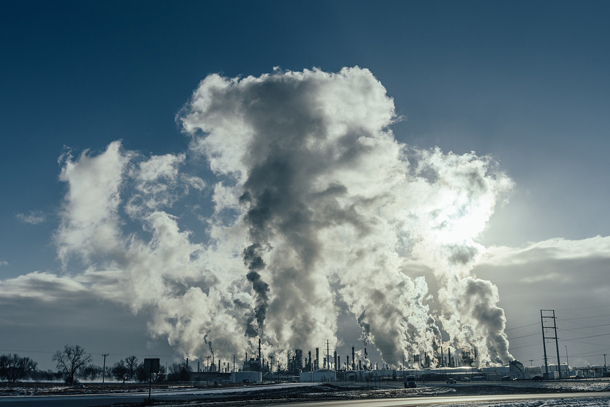
Koch Industries, Inc. owns petrochemical refining operations like Minnesota’s Pine Bend Oil Refinery, above. (Photo: Tony Webster, Wikimedia Commons CC BY 2.0)
CURWOOD: Now, the Koch brothers have had a pretty long history of working to undermine mainstream climate science. Can you describe briefly how they've gone about that?
WHITEHOUSE: Yeah, very cleverly. They obviously don't want their own names on a lot of this stuff, so they have funded a considerable array of front groups whose purpose is to hide their hand. They support groups whose only purpose in life is to launder their identity and the identity of other donors off of money so you can't follow the money behind these front groups, and they have spent a lot of money infiltrating universities so that they can create a veneer of university legitimacy around some of the things that they do. The purpose of all of that is to create a broad and, to the average reader, confusing array of multiple voices all saying the same thing, and what they don't want you to see is that behind all those tentacles is the same creature.
CURWOOD: Senator, who are some of the Koch connected people in the Trump administration?
WHITEHOUSE: At this point I think ProPublica has identified over 100 of them, but they include people as powerful as the Vice President, Mike Pence, who has always been extremely close to and indeed even a part of the Koch operation. They include Mike Pompeo, who represented the district in which the Koch brothers live and where they operate. They include the legislative affairs lead for the White House, Marc Short. Kellyanne Conway used to do polling for their front group, Americans for Prosperity. And wherever you turn you see people who are infiltrating the administration out of that Koch brothers apparatus. It's to the point where it's not even clear that this is really a Trump administration rather than a Koch administration operating with the either connivance or permission of the Trumps.
CURWOOD: Now, I understand that EPA administrator Scott Pruitt is part of this Koch conglomeration.
WHITEHOUSE: He's got a long, long, long, long history. Virtually anybody else would be long gone, even in this administration, after his long trail of misbehavior that is still being dug out. So one has to look for, what is the, like, Dark Star that is controlling the gravity here so that he does not get fired. And I think this is a little bit like he's the ambassador from the Koch brothers’ enterprise, and he's hard for the Trumps to fire without having kind of negotiated his departure with that other very powerful principality. You know, one thinks of like, medieval Europe, in which one kingdom had envoys from another kingdom and you couldn't fire them at will without checking in with your rival principality.
CURWOOD: Indeed, this does sound like something's been going on for a very, very long time. To what extent is this close relationship between government and industry or very wealthy individuals a new phenomenon, or is this something that has been going on for the ages?
WHITEHOUSE: I think it's been going on through the ages but it has reached a new level of determination and sophistication recently. I can remember fighting with the lead paint industry over all the poisoning that they were doing of children in Rhode Island with the poisonous paint that they sold into Rhode Island. They had something called the American Lead Institute that they set up to be their front group. Early on when we were fighting with the tobacco industry, they set up this American Tobacco Institute to be their front group. Those are now the kind of quaint days of corporate disinformation. By comparison, the Kochs run dozens of front groups, all with very benign or patriotic sounding names, and it's a far, far cleverer influence operation than those early institutes.
CURWOOD: To what extent do you think the Citizens United decision has given the Koch brothers and others like them a - an afterburner for their operations?
WHITEHOUSE: Good word! It absolutely was an afterburner for them. Steve, I got elected in 2006. I was sworn in in 2007. For my first three years in the Senate there was a bipartisan activity on climate change all the time. My friend John McCain ran for president carrying the Republican banner on a good climate change platform. That all came to a sudden and crashing end in January of 2010 exactly when the Citizens United decision was decided and since then the Republican side of our efforts at solving this problem has completely evaporated. It was like watching one of those heart monitors and the patient died in January of 2010 and it's been flatlined since.
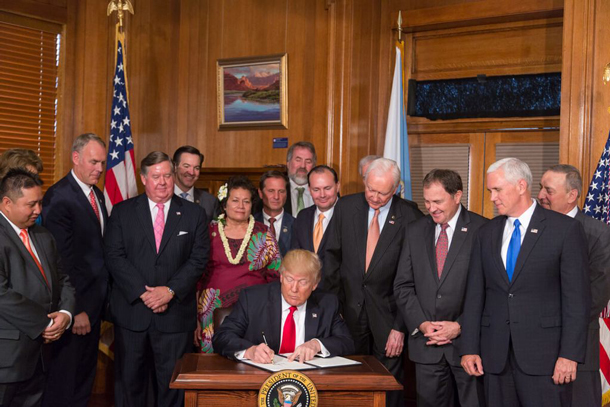
On April 26th, 2017, President Donald Trump signed the Antiquities Executive Order which directed the Department of the Interior to review prior monument designations, a step for which the Koch network claimed partial credit. (Photo: Official White House Photo)
CURWOOD: Remind folks, or even educate folks, who don't know exactly what Citizens United is in a few words for us.
WHITEHOUSE: Sure, Citizens United is the Supreme Court decision that said special interests have the right under the First Amendment to spend unlimited amounts of money in politics and the Congress is forbidden constitutionally from restricting their spending. They set up a few fake safeguards around that, which is that it had to be transparent, you had to know who they were, and it had to be independent, it couldn't connect directly to candidates. Certainly, political practice since then has shown that both of those premises were fabulously false. So, now we live in this brand new world of unlimited connected dark money political spending, and it has done terrible damage in Congress and to the faith of the American people.
CURWOOD: What can be done about this infiltration of politics by industry and billionaires?
WHITEHOUSE: Well, because the five Republican appointees on the Supreme Court hung their decision on the First Amendment, that makes it impossible for Congress to overturn. It is now constitutional doctrine. I think the decision is so awful that at some point the Supreme Court will relent, but in the meantime what we can do is to require disclosure, transparency. That was something that the Supreme Court specifically acknowledged Congress could do; but unfortunately the dark money power has gotten so great that for them, issue one is to make sure that they can keep doing their dark money work. So bipartisan support for addressing transparency and making sure people know who is behind the spending in our politics has also evaporated.
CURWOOD: Senator, recently you sent letters to the EPA, Department of Interior and several other agencies, as well as the White House, that you and your Senate colleagues are looking for some answers by May 15; what kind of response have you gotten? – and we're taping this on Tuesday May 8, by the way.
WHITEHOUSE: Zero. That is not uncommon, but we hope that at some point we will get some responses. I think not getting a response is a significant fact in itself. So, I'm not sorry that we sent these letters, but I do think that it is important that if a shadow government is being run within the United States by these billionaires that the public know that and not just lose faith in government without an understanding of what is causing their frustration.
CURWOOD: In the meantime, Senator, the climate continues to change.
WHITEHOUSE: Yeah. We're through 410 parts per million. That's a first in human history.
CURWOOD: So, what's to be done? What can you do in the Senate to respond to this phenomenon in the face of this kind of organized opposition?
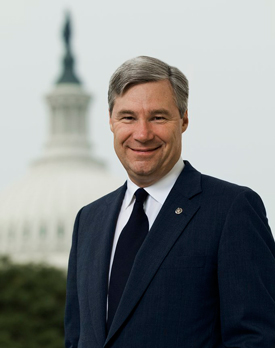
Senator Sheldon Whitehouse, a Democrat, has served Rhode Island since 2007. (Photo: Office of Senator Sheldon Whitehouse)
WHITEHOUSE: Well, we're seeing a lot of signs of real hope at the state level and at the municipal level. The mayors of the nation are doing terrific work. The financial community is coming on strong. BlackRock, the trillion dollar plus investment firm, had a very significant role in breaking the back of ExxonMobil on a climate resolution that it was opposing with its shareholders, and the financial community is more and more demanding real answers from companies about how they keep their business model, given what we need to do about climate change. And we're seeing I think increasing anxiety among rank and file Republicans that they're being asked to believe and say nonsensical things. And I think they're struggling to find a way to get around the Koch brothers fortress that they have been captive in since Citizens United. So, lots of forces are moving in the right direction and I hope that before long Castle Denial falls, and I think when it falls, it falls hard.
CURWOOD: We don't have much time left, but the states have taken major leadership in the arena of climate change and, in particular, the New York State Attorney General Eric Schneiderman who was just forced to resign took a lead on taking on Exxon Mobil and its role and dissembling to the public about what was happening. What will happen to those cases, do you think, in the absence now of Eric Schneiderman?
WHITEHOUSE: Oh, I think that the New York Department of Attorney General will continue doing its job irrespective of who the Attorney General is. They've been working very hard on this for a long time. I do believe that all of the litigation, whether it's led by the Attorneys General in Massachusetts and New York or whether it's the children's lawsuits in Oregon in Alaska or whether it's the municipalities in Colorado and California and Louisiana, all of these lawsuits are piling up and what the denial apparatus is discovering is that they can throw their weight around in politics because of Citizens United but it's way harder to throw your weight around in courtrooms. At some point you've got to produce your documents in discovery. At some point you have to take depositions under oath. The campaign of lies and influence simply crashes in the courtrooms, and so there's enormous pressure, I think, from the American court system on this operation.
CURWOOD: Sheldon Whitehouse is a Democrat who has represented Rhode Island in the US Senate since 2007. Senator, thanks so much for taking the time with us today.
WHITEHOUSE: Thanks for having me on, Steve.
CURWOOD: Asked for comment, James Davis, Freedom Partners Executive Vice President and Koch network spokesman emailed, “Our network is committed to driving action in Washington, and we’ve made clear that we’ll work with anyone to make progress on important issues.”
Full statement from Freedom Partners Executive Vice President and Koch network spokesman James Davis:
“Our network is committed to driving action in Washington, and we’ve made clear that we’ll work with anyone to make progress on important issues. We have reached out to Republicans and Democrats alike pushing to reach a permeant solution for Dreamers, expanding access to potentially life-saving treatments for terminally-ill patients, and long-overdue reform to our criminal justice system. The American people are tired of political games and hopefully both sides of the aisle are willing to step forward to address these pressing issues.”
Related links:
- The Senators’ letter to the White House regarding connections with the Kochs
- The Nation: “Senate Democrats Demand Answers About the Koch Grip on Trump”
- Public Citizen Report: “The Koch Government: How the Koch Brothers’ Agenda Has Infiltrated the Trump Administration”
- ProPublica: “What We Found in Trump’s Drained Swamp: Hundreds of Ex-Lobbyists and D.C. Insiders”
- The Intercept and Documented: “Koch Document Reveals Laundry List of Policy Victories Extracted from the Trump Administration”
- Vox: “The Citizens United era of money in Politics, Explained”
[MUSIC: Philip Boulding, “’Ohana Kai (Family of the Sea)” on Musings: Celtic Harp Originals, by Philip Boulding, Philip Boulding/Magic Hill Music]
CURWOOD: Young Alaskans demand their state take action to fight global warming. That’s just ahead on Living on Earth, keep listening!
ANNOUNCER: Support for Living on Earth comes from the Gordon and Betty Moore Foundation, and from a friend of Sailors for the Sea, working with boaters to restore ocean health.
[CUTAWAY MUSIC: Philip Boulding, “’Ohana Kai (Family of the Sea)” on Musings: Celtic Harp Originals, by Philip Boulding, Philip Boulding/Magic Hill Music]
Beyond the Headlines
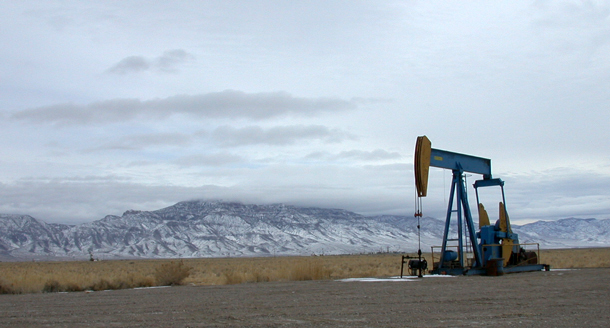
An oil rig in Tonopah, Nevada. (Photo: Don Barrett, Flickr CC BY NC-ND 2.0)
CURWOOD: It’s Living on Earth, I’m Steve Curwood. These days the news cycle can be so fast it’s hard to keep up with what’s going on but fortunately there’s Peter Dykstra. Peter is an editor with Environmental Health News, that’s ehn.org and DailyClimate.org -- and he keeps us posted as to what’s going on beyond the headlines. He’s on the line now from Atlanta, Georgia -- hi there Peter, what do you have for us today?
DYKSTRA: Hi Steve, the Energy Information Administration, it’s part of the Department of Energy, is sort of the government’s scorekeeper on how much energy we use, what kinds we use, what kinds we conserve, and all sorts of numbers and statistics, and they say that in the first quarter of 2018, oil and gas production in the United States were at an all-time high.
CURWOOD: Well that’s great news if you’re in the oil economy but maybe not such great news for the climate. What else is in their report?
DYKSTRA: It also says that the US is now the biggest oil producer in the world. Even though consumption of oil in the form of gasoline has gone down a little bit in the early part of this year.
CURWOOD: But I thought I heard actually we’re still burning up a lot of gasoline in this country?
DYKSTRA: Burning up a lot of gasoline -- you can put all the Priuses and maybe even EVs out there in the world and we’re still gonna be lashed to the gas pump for a long time to come. In fact in February of this year, 10 and a quarter million barrels of per days flowed out of US wells -- most of it going in the form of gasoline into US cars.
CURWOOD: And as I understand it, you know, across the American economy emissions have been going down except in this area of transportation and using oil?
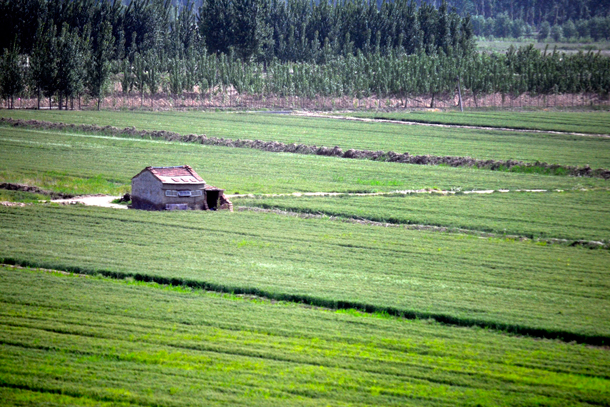
Rice from fields in seven Chinese provinces contained elevated levels of methylmercury. (Photo: IFPRI-IMAGES, Flickr CC BY NC-ND 2.0)
DYKSTRA: Right. One of the things in the EIA report that was kind of buried but to me is really significant is that transportation for the first time exceeded electricity generation as the major source of greenhouse gas emissions here in the US.
CURWOOD: Hmm … hey uh, what else do you have for us today Peter?
DYKSTRA: Let’s talk about mercury. Methyl-Mercury from coal burning is a big problem everywhere, particularly in China with all the coal plants over there.
CURWOOD: Yeah I mean it’s really dangerous, it’s a neurotoxin, it makes people crazy. Mercury was used in making hats back in the day, they say, “Mad as a hatter” comes from that. And it really affects development.
DYKSTRA: Right and there’s a study from MIT and the University of Pohang in South Korea that says that not only does China have to contend with mercury from coal burning, but once that coal burning has mercury hit the ground in the form of methyl-mercury, it gets into rice and rice is another source of health risk from mercury.
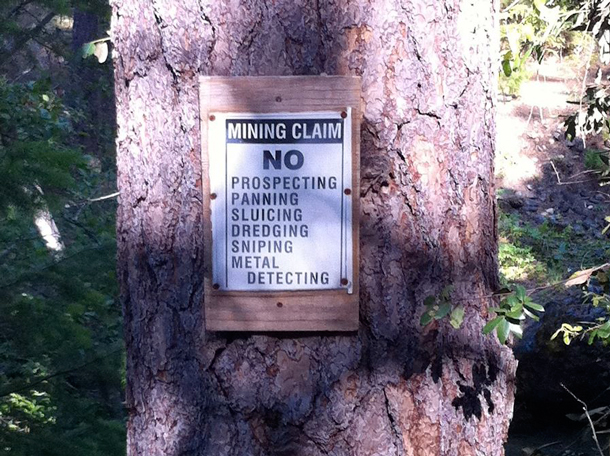
A sign staking a mining claim in South Yuba River, California. (Photo: Gregory Veen, Wikimedia Commons CC BY-SA 2.0)
CURWOOD: Well we think of mercury falling in the lakes and poisoning fish; but you’re saying rice is a problem, huh?
DYKSTRA: Yeah, it goes into rice patties, it’s in the water, it’s in the soil and then there’s uptake into the rice, which is of course, particularly in central China, a big food source.
CURWOOD: Hey, what do you have in the history vaults for us this week?
DYKSTRA: Well, let’s talk about President Ulysses S. Grant. He’s on the 50 Dollar bill and on May 10, 1872 he signed into law the General Mining Act of 1872. Its intent was to speed white settlement of the Western US.
CURWOOD: And so, what were the prices for that 1872 mining act?
DYKSTRA: For all the public land in the West, there was a lot of it then, there’s still a lot of it now, you could get an acre of mineral rights for five bucks. Five dollars, that’s still the price today, you can get an acre of mineral rights in the West on public land for the price of a bag of Doritos.
CURWOOD: Oh my. So what if you find a whole bunch of gold or copper, really valuable minerals, and for paying five dollars for the acre, you take out five million dollars worth of stuff like that. What happens then?
DYKSTRA: Yeah, the taxpayer doesn’t see any of it and for the older mines that were abandoned, this law enabled thousands and thousands of contaminated mines to stay contaminated because in the early days, there were virtually no cleanup procedures and there’s still controversy over that today in addition to the price remaining the same since 1872.
CURWOOD: Huh. Peter Dykstra’s with Environmental Health News, that’s EHN.org and the DailyClimate.org. We’ll talk to you again real soon Peter.
DYKSTRA: Alright Steve thanks a lot, talk to you soon.
CURWOOD: And there’s more on these stories at our website, Loe.org.
Related links:
- Reuters: “U.S. crude output jumps to record 10.26 million barrels per day in February: EIA”
- The Jakarta Post: “Another problem with China’s coal: Mercury in rice”
- More on President Grant’s Mining Law
[MUSIC: David Rawlings and Gillian Welch, “Dark As a Dungeon” on Live and Obscure https://www.youtube.com/watch?v=Y3IQpWoK6q4 ]
Alaska Youth Sue to Fight Climate Change
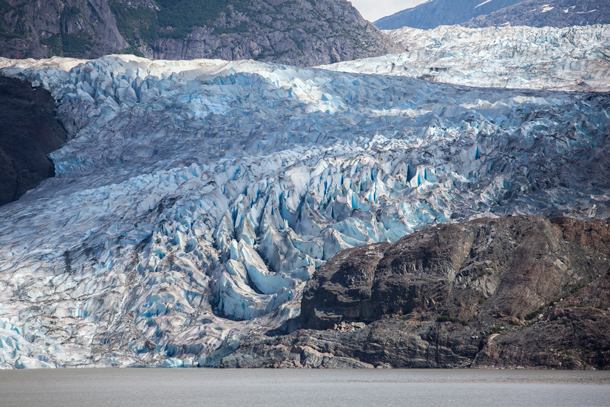
The Medenhall Glacier near Juneau, Alaska has been receding rapidly since the mid-20th century as a function of global warming. Warming in the polar regions of the world, including Alaska, occurs twice as fast as in the rest of the world. (Photo: Jeff’s Canon, Flickr CC BY-ND 2.0)
CURWOOD: The State of Alaska is seeing the fastest rise of temperatures in the US linked to climate disruption, with melting permafrost and rising seas washing away seaside communities. At the same time Alaska’s extensive and lucrative oil business is a key source of global warming gas emissions. So young Alaskans concerned about their future are fighting back. Sixteen of them have sued the state and key officials for failing to protect their right to a healthy environment now and in the future. Lawyers from the nonprofit Our Children’s Trust are supporting this suit, and similar ones in other jurisdictions. Vermont Law School professor Pat Parenteau keeps a close watch on the growing number of youth climate cases – and he’s on the line now – welcome back to Living on Earth, Pat!
PARENTEAU: Thanks, Steve. Good to be here.
CURWOOD: Now I understand that Alaska has a provision in its constitution that ensures the right of people to a healthy environment. In your view, what does this provision really require of the state?
PARENTEAU: Well, that's the big question that's been pending before the courts in Alaska right now; there is language in the Constitution that suggests that everyone in the state has a right to life, liberty, property, and that has been interpreted by the Alaska Supreme Court to include a healthy environment. The Constitution doesn't use those words, but they've been implied as unenumerated rights but the court in Alaska hasn't fleshed out exactly what that means and what obligations it might impose on, for example, the government.
CURWOOD: And what is the makeup of the Alaska Supreme Court to the extent that we can understand it at a distance?
PARENTEAU: I think it's fair to say that it's a moderate court. It's not known as a particularly progressive court, but on the other hand it's not reactionary. It's been open to arguments about how to interpret and apply the Constitution, but it's a cautious court. It's not inclined to get too far out in front in terms of interpreting constitutional rights.
CURWOOD: And talk to me about the plaintiffs who are involved in this lawsuit, it's called Sinnok v. the state of Alaska. Who are they and what exactly do they want in their lawsuit?
PARENTEAU: So, there are 16 plaintiffs of various ages, some quite young and some in high school and right up to the college level. Some of them are native Alaskans, quite a few of them. They're from various parts of Alaska. The complaint that was filed in the case goes into great detail actually on the individual youth plaintiffs and how precisely they're affected by the changes that they're seeing in their life every day. One of the - the lead plaintiffs in the case in fact has talked about how his village that's on the seashore is eroding and how he's concerned about sea level rise and the impact on his community.
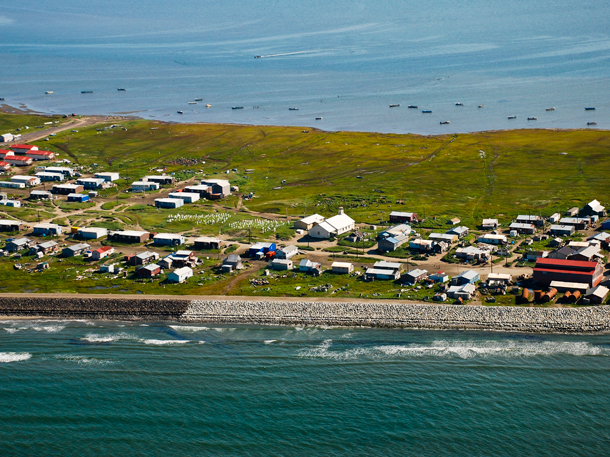
Esau Sinnok, the named plaintiff in the Sinnok v. State of Alaska case, is from Shishmaref, Alaska. Shishmaref, pictured above, is one of many coastal towns and islands that are facing threats from erosion and sea level rise, as a result of rapid climate disruption. (Photo: Bering Land Bridge National Preserve, Wikimedia Commons CC BY 2.0)
The plaintiffs, once again as they are in some of these other climate change cases are seeking some pretty sweeping, both declarations of their rights under the Constitution and how those rights are being infringed by both what the state of Alaska is doing and not doing, but they're also asking for a science-based plan of attack or a plan of how to deal with climate change through reducing greenhouse gas emissions based on what the science requires and that's something on the order of eight percent per year reduction in emissions plus an accounting of the emissions that the state is responsible for, and how fast they're being reduced. So, pretty broad sweeping remedies they're seeking.
CURWOOD: And who are the defendants in this case? I imagine it's the state?
PARENTEAU: The state of Alaska, the governor of Alaska, many of the leading agencies, the Department of Environmental Conservation and so forth are all defendants in the case.
CURWOOD: So, to what extent is the state arguing that the science doesn't compel action at this point?
PARENTEAU: They're not making the science argument at all, in fact, the complaint in the case cites many different statements by the state legislature, by the governor, by the agencies acknowledging that climate change is real, acknowledging it's causing severe problems for Alaska, acknowledging the need to reduce emissions. But then of course the documents stop after acknowledging all that and they're not taking any specific actions to reduce. They're taking the opposite actions. The argument that the state is making is that - not that the science doesn't require action, - but that Alaska is in a very difficult position and would have to be sacrificing income and culture and health care and on and on, a lot of social services, if it were to suddenly or dramatically begin curtailing the one major product that it can export which is fossil fuels. So, having acknowledged all this, the state is sort of stuck in the position of saying, yeah, we know we need to be doing something, we just don't know exactly what that is or how to go about it without causing major social disruptions by curtailing development of these resources.
CURWOOD: This is a tough case in a state, that is, if there's any state that’s addicted to oil, it has to be Alaska. The state has great interest in the pipeline, a bunch of wells up on the North Slope for oil and gas. It's big business up there; in fact, Alaskans get a - a dividend every year. They get a check based on the royalties. How popular do you think this lawsuit is in Alaska?
PARENTEAU: I don't know that there's been any polling on it, but if there was I'd be surprised if it enjoyed much support. You're right, I mean, fossil fuels, oil and gas are the lifeblood of Alaska, and if anything they're pressing for greater expansion and into the Arctic National Wildlife Refuge, offshore, onshore, everywhere they can find major deposits. Both the representatives in Congress, Senator Murkowski and others, pushing very strongly for Alaska to continue to develop its oil and gas resources. So, you have a juxtaposition here of a state that's suffering, probably what you’d call disproportionate impacts from climate change at the same time they're accelerating the development of the fuels that are going to exacerbate those very impacts. But the question for the court is going to be all of that being true, what's the role of the court in ordering the government to take action as opposed to waiting for the legislative and executive branches of the government to actually start the process at least of taking action? That's kind of where we're picking up the action in this lawsuit.
CURWOOD: And I'm imagining that that was the basis of throwing out a similar suit going back a few years?
PARENTEAU: It was, and the state in this case is saying, “Here they are the plaintiffs are back again with essentially the same arguments and the same request of the court that was rejected by the Supreme Court.”
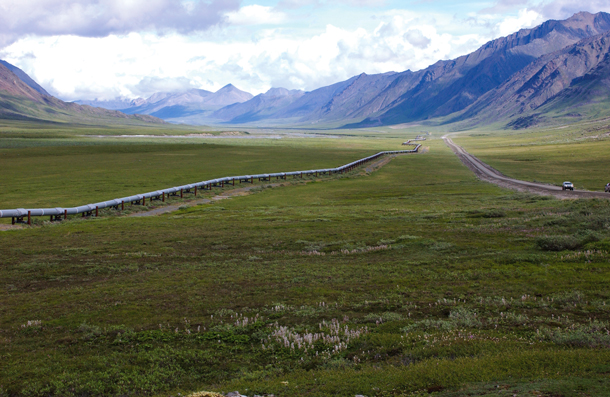
The state of Alaska is friendly to oil, since the vast majority of the Alaskan economy relies on fossil fuel production. Above, the Trans-Alaska Pipeline runs through the Brooks Range of northern Alaska. (Photo: U.S. Geological Survey, Flickr public domain)
I think the earlier case was dismissed in 2014 and I think the plaintiffs in this case are facing a difficult challenge because the one difference between this case and the earlier case is that the plaintiffs did file a petition with the agencies in Alaska seeking broad scale rulemaking and policies to address real reductions in emissions. That petition was denied, and so the plaintiffs now are saying to the court, “You instructed us to try to seek relief from the state agencies, we did that, we got nowhere with that, we're back to you saying we're stuck at this point. We can't get the legislature to move, we can't get the agencies to move. The courts are our last resort. Will you now take action?” So, that's what the plaintiffs have said is, “We tried the other route, the political route it didn't work. Things are getting worse, we need relief”.
CURWOOD: And how does this compare to the other cases who we see now in the US, the federal case in Oregon, more recently there's been a matter brought in the state of Florida. What does this trend say? What does this trend mean?
PARENTEAU: It's testing these theories which are very similar against a body of state law, in different states as you just mentioned, and so it's probing, it's trying to find a breakthrough case where you can find a state supreme court willing to make a really bold decision finding not only a right to a healthy environment, or a safe climate, stable climate, but also finding a duty on the part of the government to take real tangible action to address that.
It's like what happened in Pennsylvania when the Pennsylvania Supreme Court finally interpreted the state constitution to actually mean that local communities can block, for example, fracking operations in the Marcellus Shale seeking to extract oil and gas and saying that these communities and the people that are affected have a right to at least contest these kinds of developments. We have yet to see where any of these oil and gas operations have been stopped as a result of these constitutional rights that have been recognized, but at least the Pennsylvania Supreme Court has put down a very strong marker that there could be a limit to how far you can go pushing extraction of fossil fuels that are causing these various kinds of impacts.
CURWOOD: Pat Parenteau is a Professor at Vermont Law School. Thanks for taking the time with us today, Pat.
PARENTEAU: Thank you, Steve.
CURWOOD: Speaking for the state of Alaska and Governor Bill Walker, Assistant Attorney General Sean Beausang said the suit should not be allowed to go to trial.
He told the court, “Alaska is not destroying the environment. Alaska is not causing climate change.'"
Related links:
- InsideClimate News: “Kids challenge Alaska’s climate paradox: the state promotes oil as global warming wreaks havoc”
- Press release from Our Children’s Trust: “Constitutional climate lawsuit brought by young Alaskans heard in Anchorage”
[MUSIC: Marcus Roberts, “It’s Maria’s Dance” on Blues For the New Millennium, Columbia]
CURWOOD: Coming up, an organic feast from the rooftop, as our series on India’s Kerala continues. That’s just ahead here on Living on Earth, stay tuned!
ANNOUNCER: Funding for Living on Earth comes from you our listeners, and United Technologies - combining passion for science with engineering to create solutions designed for sustainability in aerospace, building industries and food refrigeration. UTC companies such as Otis, Carrier, Pratt & Whitney and UTC Aerospace Systems are helping to move the world forward. You can learn more about United Technologies by tuning in to the Race to 9 Billion podcast, hosted by UTC’s Chief Sustainability Officer. Listen at raceto9billion.com. That’s raceto9billion.com. This is PRI, Public Radio International.
[CUTAWAY MUSIC: Marcus Roberts, “It’s Maria’s Dance” on Blues For the New Millennium, Columbia]
Pesticide Peril in Paradise
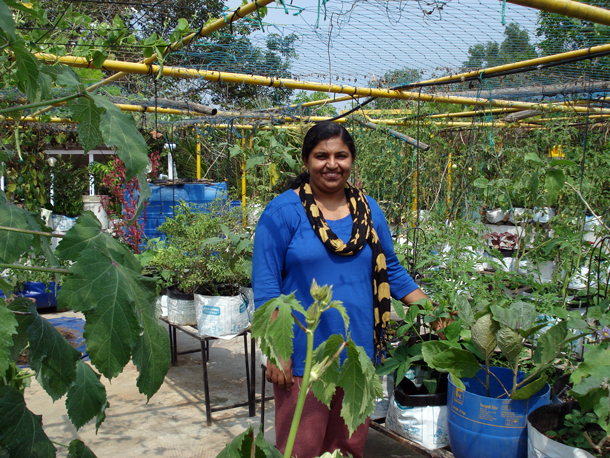
Sujitha Sudhakaran grows dozens of vegetables on her roof terrace using her own organic compost. (Photo: Helen Palmer)
CURWOOD: It’s Living on Earth, I’m Steve Curwood. Kerala state in South India has a lush tropical climate, with bananas, and coconuts lining the roads, and spices growing in the shade of bountiful papaya and guava trees. So one might think there is plenty of organic food in Kerala, given the ease of growing, as well as the perception of its educated population that troubling cancer rates are tied to chemical farming.
But Keralans prefer white collar jobs in the Middle East to tilling the soil at home, so fields lie fallow and food with pesticide residues is imported. Now that’s changing as the state government has developed plans to take Kerala’s agriculture 100% organic by 2020. And already many urban dwellers are taking up organic gardening on their rooftops with enthusiasm and passion. Living on Earth’s Helen Palmer has our story.
[TINNY MUSIC PLAYING IN TAXI]
PALMER: To see what organic home gardening means in practice in Kerala, I took a bumpy taxi down dusty pot-holed lanes to the outskirts of the capital Trivandrum to meet Sujitha Sudhakaran…
[CAR DOOR SLAMS, TAXI IDLING, MUSIC CONTINUES]
SUDHAKARAN: Hi Helen!
PALMER: Hi Sujitha, thank you for coming to meet me!
SUDHAKARAN: Oh, it’s so nice to meet you!
PALMER: So great to meet you!
PALMER: Sujitha’s medium height and plump, with laughing black eyes and a royal blue blouse over maroon pants. She and her husband Manu live in a tidy square house set back from the road amid a riot of green – flanked by fruit trees with dozens of pots full of plants and waterlilies crowding the front courtyard ….
SUDHAKARAN: Actually I have almost 27 varieties of waterlilies here and mainly these are tropical varieties which blooms a lot, and all the dragonflies and butterflies, honey bees, all these get attracted to these water bodies and my pollination in my vegetable garden is taken care by these flies and bees.
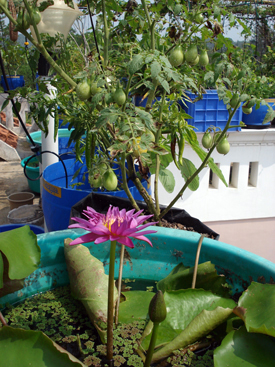
Water lilies attract bees and dragonflies that help fertilize Sujitha’s tomatoes and chilies. (Photo: Helen Palmer)
PALMER: And that looks like a grape vine growing over the trellis on the top here?
SUDHAKARAN: Yes, yes, it’s a grape-vine, I planted it one year back and I’m expecting fruits this year. Because the grapes that we get here is almost full of pesticides. They spray a lot of pesticides in order to get the fruits, so I thought OK at least one bunch I can eat without pesticide.
[SUJITHA LAUGHS]
PALMER: Pesticides. That’s the problem Sujitha and thousands of other concerned Keralans are trying to solve by going organic. Both doctors and the public believe chemicals lurking in food share a large part of the blame for high levels of cancer in Kerala, and that’s led the state government to call for a totally organic agricultural sector by 2020. One group of Keralans in particular has taken up gardening without pesticides or chemical fertilizers with special zeal -- educated professionals. Take this retired bank executive – who lives on a busy street behind a sturdy metal gate in a fashionable Trivandrum suburb.
[SOUNDS OF TRAFFIC, GATE CLANGING, AND WORKMEN BANGING]
KRISHNAN: I’m Unni Krishnan. I was designated the agriculture officer, financing farmers and agriculturalists, and that was a turning point in mid-life.
PALMER: Unni Krishnan is tall, earnest and white haired. That turning point working with farmers made him retire from his safe, comfortable job at the State Bank of Travancore 12 years early to grow his own food, and to teach other people how to do the same. He says he’s inspired hundreds….
KRISHNAN: Around 400, to 500 people I have inspired, you know.
PALMER: Really?
KRISHNAN: Yes sure, through Facebook also, people get inspired.
PALMER: In the large garden he has behind the gate, neat rows of dozens of pots of chiles, okra, eggplant, amaranth and cabbages spill over from the garden to the patio. On his three roof terraces, gourds and tomatoes hang from the tall shade trellis he built with hemp rope and bamboo. On a wall, scarlet chili peppers sit on a plate drying in the sun. Unni says he has to water his many pots and bags twice a day and it takes hours, but that’s OK, it’s his passion.
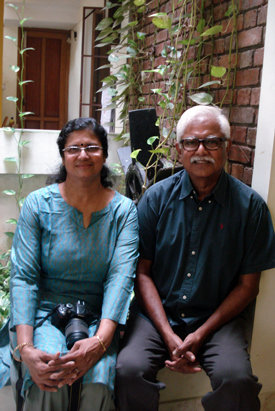
Unni Krishnan (right) and wife Latha (left) have three large roof terraces. Unni used to work at the state Bank of Travancore, but retired early to grow his own organic food and inspire other Keralans to do the same. (Photo: Helen Palmer)
KRISHNAN: My work is my hobby, it’s a kind of meditation for me. I don’t identify outside world when I do this work.
PALMER: His garden is a calm oasis on a busy street, with high brick walls surrounded by tall coconut palms. He shows me the potting mix he prepares and hands out with grow bags.
KRISHNAN: This is potting mix I give. Potting mix, it is a combination of soil, then peat, then organic fertilizer also.
PALMER: How is the soil in Kerala?
KRISHNAN: Actually it’s a bit acidic in Kerala, so probably you can use that lime to make it alkaline.
PALMER: The poor soil he points to is not a problem for home gardeners like Unni Krishnan who takes feeding the soil very seriously and can easily afford that lime. At her home, Sujitha Sudhakaran has her own whole complex system set up outside her kitchen, where workmen are installing a new cupboard for her.
SUDHAKARAN: For my plants which are on the top, I make compost. I make vermicompost and I make bokashi composting.
PALMER: So Bokashi is what? It’s not a word I know.
SUDHAKARAN: Actually it’s a Japanese word which means ‘ferment, to ferment’, and it’s a technology wherein we add micronutrients directly to the compost so that the decaying process fastens. So I get almost all the compost which is required for my plants from my home, so I don’t buy it from outside.
PALMER: She points to her dozens of buckets – old industrial containers salvaged from the scrap heap.
SUDHAKARAN: This is mainly my composting area.
PALMER: Oh I see you’ve got many many big containers, these are all full of compost?
SUDHAKARAN. Compost – one will be full of cow dung, one will be with another type of compost, one will be with coffee grounds and egg shells, and this one is like rice water, starch which I use as a pesticide, this is a biogas plant…
[WORKMEN BANGING]
… wherein I can put all the waste into it and the biogas slurry will be collected at the other end, which I can use as a fertilizer for my plants.
PALMER: So they collect the biogas and use the biogas, and what’s left you can use as fertilizer?
SUDHAKARAN: Yes, the gas I can use for cooking and the slurry, the left over, that I can use for my plants.
PALMER: Gosh, so what goes into the biogas plant?
SUDHAKARAN: All the waste, I mean kitchen waste, we can put fish waste, chicken waste, not the bones, but the other meat part, we can put in there, left over rice we can put in there – except lemon we cannot put that – onion peels, we cannot put that also, so all the other things, it goes into that.
PALMER: Wow! And it generates biogas for you?
SUDHAKARAN: Yes for cooking, and at the same time the slurry is collected.
PALMER: That’s extraordinary that somebody does that on a home level.
SUDHAKARAN: [LAUGHS] Yeah.
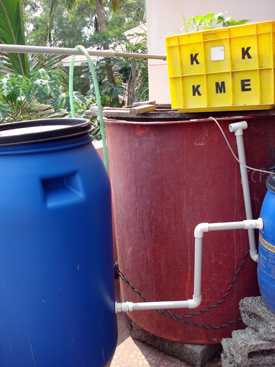
Sujitha built her own hydroponic system on her roof terrace, and uses the fish waste as fertilizer. (Photo: Helen Palmer)
[SOUNDS OF CLIMBING STAIRS, OUTSIDE SOUNDS, DISTANT TRAFFIC]
PALMER: And Sujitha is extraordinary – we climb up to her roof terrace where she keeps an aquaponic system and grows rice….
SUDHAKARAN: There are fishes inside this – this tank…
PALMER: Oh I see! what kind of fishes? They look like goldfish.
SUDHAKARAN: This is spotted fish, and there is another one, tilapia. I harvested, I planted a paddy, but I harvested and now it’s not there, this is a second crop –this is a kind of spinach, these are chili plants, I pruned it, and these are cow peas.
PALMER: I’m astonished by how much she can grow in her bags and pots – they’re just pots, they’re not garden beds. Sujitha’s husband, Manu, tells me she grew enough food for a feast for their whole extended family at India’s Thanksgiving, the late summer harvest festival Onam.
MANU: Last Onam, we decided to call all our family here and we all joined and we made food out of what we’d grown from our terrace, so completely it was from our terrace.
PALMER: So what did you actually eat?
MANU: We made – we call it sadya – we’ll have boiled rice, there would be something called avil, which is made out of 4 different vegetables, we use a lot of vegetables, and then there would be a curry that is called a sambah, which is made out of, again vegetables, so it would be a complete vegetarian feast. So including the rice, everything required for that was grown here, in our terrace!
PALMER: The bounty of food from organic home gardeners like Sujitha has helped launch another Kerala innovation – organic markets.
[BUSY TRAFFIC]
On Saturdays, small farmers and rooftop cultivators bring their spare produce to the Centenary Indoor Stadium. It’s a large shed in the heart of Kerala’s cultural capital, Thrissur, about 180 miles north of Trivandrum.
[NOISY TRAFFIC, ECHOEY MARKET SOUNDS, CHATTER]
Outside the stadium, incessant traffic circles a large park where a solemn elephant tethered under large trees munches on palm fronds; inside, trestle tables are piled high with bananas and squash, spinach, tamarind, bottles of coconut oil, yams, papaya and spiky young jack fruit. The place is packed, and I’m instantly cornered by a large man.
JOSEPH: My name is not that difficult, it’s Paul Joseph.
PALMER: He tells me he’s at the market as a buyer and a seller.
JOSEPH: I have an orchard where I have most of the things, like most of the vegetables and fruits. I have different varieties of papaya, the Red Lady and one variety from US also I have – and I do have a lot of naranjas, you know, citrus fruits.
PALMER: Aha – so oranges?
JOSEPH: Not oranges, oranges are not grown in this part, limes, different types of limes.
PALMER: Limes? Okay.
JOSEPH: And leafy vegetables, plenty leafy vegetables.
PALMER: Paul Joseph retired after 28 years as a chief engineer in the merchant marine, and he’s an enthusiastic guide to the market, identifying unfamiliar looking vegetables.
PALMER: What is that?
JOSEPH: Spinach, that’s a different kind of spinach.
PALMER: Aha – what are those things beside it?
JOSEPH: That one is – you know the banana tree?
PALMER: Yeah.
JOSEPH: It’s the stem of the banana tree.
PALMER: The stem of the banana tree?
JOSEPH: They say that it’s very good for diabetes and all those things. And the next one is noni.
PALMER: Noni?
JOSEPH: It’s an anti-oxidant, they say that it’s very good for cancer, it’s a Brazilian fruit.
PALMER: It’s a fruit?
JOSEPH: It’s a fruit. The next one is a yam. –
PALMER: A yam, OK.
JOSEPH: There are 2 different interesting things – this is the urine of the cow – it’s used in two ways. One, this is used as pesticide, and also as medicine.
PALMER: As medicine?
JOSEPH: Yeah.
PALMER: People take it? People drink it?–
JOSEPH: How do they use it I have no idea.
SANOJ: It is a general health tonic –
PALMER: Say again?
SANOJ: General health tonic.
PALMER: People drink it?
SANOJ: Yes, drink it – do you want to taste it? Want to taste it? –
PALMER: NO! [LAUGHS]
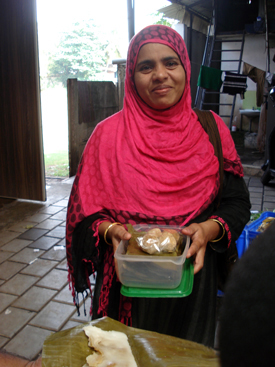
Sheba made a popular snack of rice flour and coconut sugar, steamed in a banana leaf, that’s known as Adha. (Photo: Helen Palmer)
PALMER: Cows, of course, are sacred in Hindu India, and though about 20% of Kerala’s population are Catholics like Paul Joseph, cow manure and urine are still put to many uses.
There are good things to eat at the market too – as well as selling spinach and curry leaf, Sheba, a home maker in a brilliant fuschia headscarf, has prepared adha, a popular sweet snack of rice flour, grated coconut and jaggery, raw coconut sugar wrapped in a banana leaf.
SHEBA: This making rice powder and including certain sweets.
PALMER: And you cook it in a banana leaf?
SHEBA: Banana leaf.
PALMER: And you boil it?
SHEBA. Steaming, steam.
PALMER: Steam…
SHEBA: Yes.
PALMER: – It’s very sweet, but actually quite delicious. Among the farmers are retired doctors, and university professors, and business people. Another home maker, Seena Mohan, dressed in a stylish sari and married to the owner of two movie theaters, is there buying organic tomato seedlings with her daughter Sapna, an eye doctor who explains her mother’s plans.
SAPNA MOHAN: We have an empty space – so she likes to do a bit of farming, actually for vegetables which are pure - even she’s planning to buy a cow!
PALMER: Really? What do you think about this?
SAPNA MOHAN: I don’t know, I have no time to look after, she is more interested, so let her try.
PALMER: Why do you want to do this?
SEENA MOHAN. Because we are hearing about this poison and everything in our foods – even we are importing these foods from other countries – I am starting cultivating fruits and vegetables, different type, just starting.
PALMER: So tomatoes – what else will you grow?
SEENA MOHAN: Tapioca, yeah, tapioca, then tomato, the chili, then coconuts, then banana, lot of fruits, mangosteen, rambutan, different types of mangos, different types of Jack fruits - I planted, I think I planted 60 numbers of fruits trees plants.
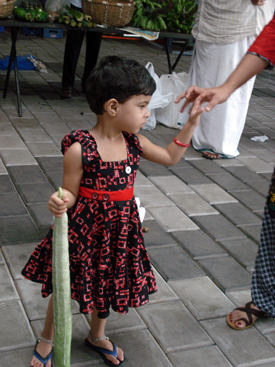
The snake gourd is a popular Keralan vegetable, even among children. (Photo: Helen Palmer)
PALMER: I’m struck by the easy relationships in the market – growers and customers like Seena, who’s Hindu, Sheba, a Muslim, and Paul Joseph, who is Catholic, are united by their common passion for growing and spreading the gospel of healthy organic food. I meet one of the market organizers, Sandhya Kumar, who’s infectiously cheerful and energetic – and like so many, has taken on a second career as an organic gardener.
KUMAR: Last 24 years I was working as a teacher in our area schools, then became passionate towards agriculture, I resigned the job, and I’m doing agriculture now, last 2 years, I started agriculture – and I’m fully organic.
PALMER: On her fully organic acre of land, Sandhya grows the now familiar staples -- coconuts, bananas, eggplants, nutmeg, pepper -- but she also has hens, goats, a cow and a down-to-earth, very business-like approach.
KUMAR: So with that cow I am making ghee and paneer also, as value added products.
PALMER: So ghee is clarified butter, I know and paneer is cheese.
KUMAR: Hmm, with the hibiscus flower I will make squash, like that.
PALMER: So you make hibiscus flower squash?
KUMAR: [LAUGHS] Then brinjal – I will make pickles.
PALMER: Ah – pickled eggplant.
KUMAR: And virgin coconut oil also I am making, with our own coconut, with that I am making virgin coconut oil. Plenty of people are waiting for these organic products so no problem at all selling. [LAUGHS]
PALMER: That is very good!
KUMAR: Milk also I am selling!
PALMER: The milk from the cow?
KUMAR: Goat, goat milk also.
PALMER: Goat?
KUMAR: 100 rupees per liter the milk – normally here, one liter ordinary cow’s milk will cost 40 rupees, now goat milk costs 100 Rupees, that’s the difference.
[TRAFFIC SOUNDS FADE, BIRDS AND GARDEN SOUNDS]
PALMER: Sandhya invites me to her farm – she lives in a large cool house shaded by coconut palms and jack fruit trees at the end of a long drive.
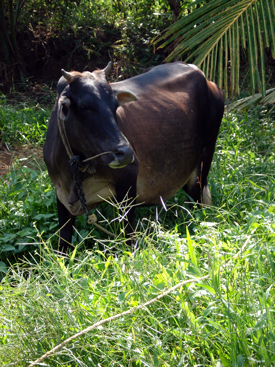
Sandhya’s acre of land is also home to hens, goats, and a cow as well as her organic garden. (Photo: Helen Palmer)
[DOG BARKS]
KUMAR: My husband.
PALMER: Pleased to meet you.
AJIT KUMAR: Hello.
KUMAR: So this is our home.
PALMER: And your name is, Sir…?
AJIT KUMAR: Ajit.
PALMER: Ajit?
KUMAR: Don’t ask anything about agriculture, organic, he will not know anything about that!
PALMER: He is a businessman you say.
[SANDHYA LAUGHS]
PALMER: Business man. But you support your wife?
AJIT KUMAR: Supporting. Fund is mine, all funding is mine!
[AJIT AND SANDYA BOTH LAUGH]
PALMER: Ajit runs a successful chain of coffee shops that employ people with disabilities.
[BIRDS, WALKING THROUGH DRY LEAVES]
Sujitha leads the way out to the wide green garden behind the house. There are coconut palms, bread fruit, dozens of banana and mango trees and in their shade, she plants spices.
KUMAR: This year I planted the ginger.
PALMER: That is ginger?
KUMAR: Ah, it’s ginger. Ginger last year in our market, 10 Kgs, I sold out, 100 Rupees per Kg.
PALMER: 100 Rupees per kilogram?
KUMAR: Non-organic, 60 Rupees per kilogram –
PALMER: But organic 100.
[GOATS BLEATING, WALKING THROUGH DRY LEAVES, BIRDS]
PALMER: We thread our way through her lush jungle of fruit trees and spice bushes, their roots kept cool by palm fronds and dead leaves as mulch. We pass the goat pen -
[GOATS BLEATING]
- and reach the bank of a small irrigation ditch where her dark brown cow is grazing. Her name is Muta, which means Pearl. Around her banana trees Sandhya has spread the goats’ droppings – and she says the cow and her calf give useful products beyond milk. We walk to her cowshed – basically just a roof of interlaced palm fronds over a concrete floor that slopes down to a shallow tank in one corner.
KUMAR: In this tank we will collect urine. These 2 buckets, every weekly once, I made that organic manure with the cow dung, cow urine, then jaggery, then soil.
PALMER: Jaggery is concentrated raw sugar made from coconut palms. Sandhya says that manure not only fertilizes her plants but has transformed her soil since she started her organic garden two years ago.
KUMAR: Every year I can feel the change in this soil. Just two years before, I felt this soil as dead. Now I can feel it just smart like me, the soil!
[SANDYA LAUGHS]
PALMER: It’s full of earthworms and leaf mold now, she says. As we head back to her house, Sandhya confides….
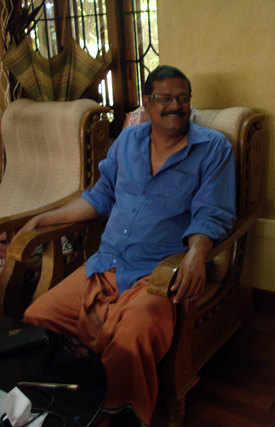
Sandhya refers to her husband Ajit (above) as “elephant lazy,” since he likes to sit and watch TV. But he pays for whatever she wants for her organic farm. (Photo: Helen Palmer)
KUMAR: My husband is elephant lazy – like that way I call you understand what’s that? Very lazy, that much lazy. 24 hours he will sit like this, watching TV or doing something. Then whatever I ask, he will give – money – no inquiry, no interventions, nothing.
PALMER: It sounds like a perfect marriage!
[SANDYA LAUGHS]
PALMER: Sandhya and Ajit and the investment of labor and cash they’re prepared to make are typical of Kerala’s middle-class backyard and rooftop gardeners. And they’re part of the state government’s calculation for how it can reach its ambitious Green Kerala goals – 100% organic food by 2020 -- at least as far as vegetables are concerned.
For Living on Earth, I’m Helen Palmer in Kerala, India.
[BIRDSONG]
Related link:
The Government of Kerala, India
CURWOOD: On the next Living on Earth, replanting the teak trees in Kerala to stop erosion and bring rain.
THARAKAN: Definitely it’s a part of reforestation, because we follow here rainwater harvesting and rain can happen only if there is forest. We are taking so many things from the Nature, so we should give something back to them.
CURWOOD: Greening Kerala’s hillsides to help fight climate change --- next time on Living on Earth.
[MUSIC: Bela Fleck and the Flecktones, “Flight Of the Cosmic Hippo” on Flight Of the Cosmic Hippo, Warner Bros.]
CURWOOD: Living on Earth is produced by the World Media Foundation. Our crew includes Naomi Arenberg, Bobby Bascomb, Savannah Christiansen, Jenni Doering, Jaime Kaiser, Hannah Loss, Don Lyman, Helen Palmer, Aynsley O’Neill, Adelaide Chen, and Jolanda Omari.
Tom Tiger engineered our show, with help from Jeff Wade and Jake Rego. Alison Lirish Dean composed our themes. You can hear us anytime at L-O-E dot org - and like us, please, on our Facebook page - PRI’s Living on Earth. And we tweet from @livingonearth. I’m Steve Curwood. Thanks for listening!
ANNOUNCER1: Funding for Living on Earth comes from you, our listeners, and from the University of Massachusetts, Boston, in association with its School for the Environment, developing the next generation of environmental leaders. And from the Grantham Foundation for the protection of the environment, supporting strategic communications and collaboration in solving the world’s most pressing environmental problems. Support also comes from the Energy Foundation, serving the public interest by helping to build a strong, clean, energy economy, from Carl and Judy Ferenbach of Boston, Massachusetts and from SolarCity, America’s solar power provider. SolarCity is dedicated to revolutionizing the way energy is delivered by giving customers a renewable alternative to fossil fuels. Information at 888-997-1703. That’s 888-997-1703.
ANNOUNCER 2: This is PRI, Public Radio International.
Living on Earth wants to hear from you!
Living on Earth
62 Calef Highway, Suite 212
Lee, NH 03861
Telephone: 617-287-4121
E-mail: comments@loe.org
Newsletter [Click here]
Donate to Living on Earth!
Living on Earth is an independent media program and relies entirely on contributions from listeners and institutions supporting public service. Please donate now to preserve an independent environmental voice.
NewsletterLiving on Earth offers a weekly delivery of the show's rundown to your mailbox. Sign up for our newsletter today!
 Sailors For The Sea: Be the change you want to sea.
Sailors For The Sea: Be the change you want to sea.
 The Grantham Foundation for the Protection of the Environment: Committed to protecting and improving the health of the global environment.
The Grantham Foundation for the Protection of the Environment: Committed to protecting and improving the health of the global environment.
 Contribute to Living on Earth and receive, as our gift to you, an archival print of one of Mark Seth Lender's extraordinary wildlife photographs. Follow the link to see Mark's current collection of photographs.
Contribute to Living on Earth and receive, as our gift to you, an archival print of one of Mark Seth Lender's extraordinary wildlife photographs. Follow the link to see Mark's current collection of photographs.
 Buy a signed copy of Mark Seth Lender's book Smeagull the Seagull & support Living on Earth
Buy a signed copy of Mark Seth Lender's book Smeagull the Seagull & support Living on Earth

